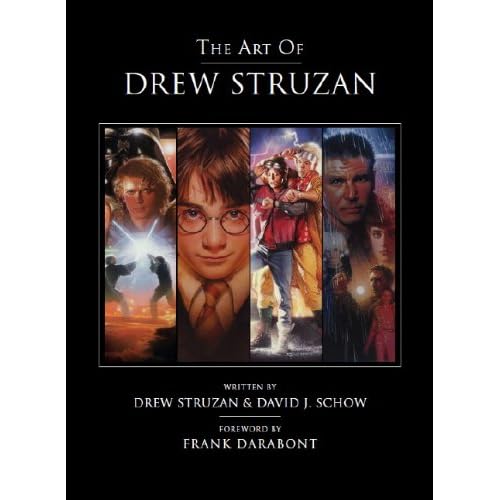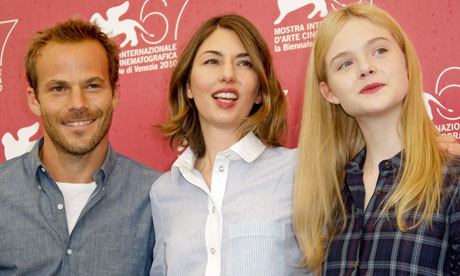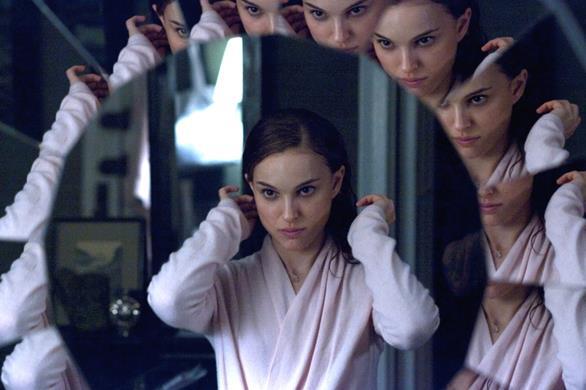Cinematography by the sublimely talented Roger Deakins.
Tuesday, 28 September 2010
Monday, 27 September 2010
Cool commerical
I have yet to succumb to the charms of the iPad. I know I will one day, but, for now, my resolve remains strong. Despite this kooky ad, directed by Roman Coppola.
Sunday, 26 September 2010
Andrew Garfield LA Times interview
 Never Let Me Go and Social Network star Andrew Garfield and I talk Facebook and Spider-Man in this interview for the LA Times.
Never Let Me Go and Social Network star Andrew Garfield and I talk Facebook and Spider-Man in this interview for the LA Times.
Saturday, 25 September 2010
New Monsters featurette
It's one of my favourite films of the year and if you live in the US you can download it now via iTunes and On Demand right now, well ahead of its October 29 theatrical release. So, what are you waiting for?
Thursday, 23 September 2010
Fringe season three preview
It's back on in the States soon, and in the UK soonish (I hope). And from the look of this, we've got some fun stuff ahead, Earth hopping and the like.
Undercovers preview
I'll watch anything that JJ Abrams has his hand in, because the man's not let me down yet; although the advance reviews for his latest show haven't been too good. I'm not sure when this airs in the UK, but I'll certainly give it a go when it does.
DVD review: Dogtooth (****)
An intense and downright disturbing examination of the dangers of excessive parental control and conditioning, this powerful and provocative film from Giorgos Lanthimos firmly positions him as the Greek Michael Hanke.
A man (Christos Stergioglou) and his wife (Michelle Valley) keep their three unnamed children — the publicity material lists them as Son (Pasalis), Elder Daughter (Aggeliki Papoulia) and Younger Daughter (Mary Tsoni) — hidden away within the confines of their isolated family home which, despite the expansive, well-tended grounds and inviting swimming pool, is little more than a prison. The outside world is off limits and evil. Only Father, who appears to have a good job at a factory, ever leaves, and that’s by car — walking is expressly forbidden.
The three are raised by the parents, who educate them via cassette recordings, feeding them lies and misinformation. They’re encouraged to get on all fours and bark like dogs, instructed cats are dangerous animals, and informed Mother will soon give birth to a dog. The children — who, at a guess, are in their mid to late twenties — spend their days taking part in strange tests and cleaning the house. For fun, they re-enact scenes from movies — among them Rocky and Jaws. A treat is when the entire family listens to Frank Sinatra after dinner, although Father tells them it’s their uncle singing and mistranslates the lyrics.
Their only interaction with the outside world is Christina (Anna Kalaitzidou), a security guard, who Father pays to sexually service the Son on a weekly basis, but is, in turn, serviced by the Older Daughter in exchange for gifts. (When Father finds out, his retribution is shocking and brutal.) As the film progresses, cracks tear apart the domestic “status quo” and violence erupts. Son skewers a cat with shears; Older Daughter takes a kitchen knife to her brother’s arm.
There’s a stark, graphic quality to Lanthimos’ filmmaking. Even his framing is unsettling, the camera often cropping off heads, a stylistic device that only adds to the all-pervading sense of disquiet and unease. Moreover, the film isn’t interested in explaining or analysing the parents’ actions, leaving their motives shrouded in mystery. Are they conducting some kind of social experiment, protecting their children’s innocence from outside forces? Or are they, simply, middle-class monsters? (It’s probably the reason both Blu-ray and DVD are totally devoid of extras beyond the trailer.) Forget the Saw series or Hostel’s torture porn, if you want real horror, then this is for you.
There’s a stark, graphic quality to Lanthimos’ filmmaking. Even his framing is unsettling, the camera often cropping off heads, a stylistic device that only adds to the all-pervading sense of disquiet and unease. Moreover, the film isn’t interested in explaining or analysing the parents’ actions, leaving their motives shrouded in mystery. Are they conducting some kind of social experiment, protecting their children’s innocence from outside forces? Or are they, simply, middle-class monsters? (It’s probably the reason both Blu-ray and DVD are totally devoid of extras beyond the trailer.) Forget the Saw series or Hostel’s torture porn, if you want real horror, then this is for you.
Wednesday, 22 September 2010
Must buy: The Art Of Drew Struzan
Monday, 20 September 2010
Ben and Rebecca
The very talented, very lovely and very tall Rebecca Hall, together with the very talented, very tall and equally lovely Ben Affleck, being interviewed after last night's special screening of The Town.
Twitpic originally posted here.
Twitpic originally posted here.
Saturday, 18 September 2010
Public service annoucement
 If you live in the US, make sure you go to see Never Let Me Go this weekend. When the film finishes, leave the cinema, have a stiff drink or a cup of strong coffee, then turn around, and go back and see The Town. We can't complain they don't make good movies anymore if we don't support them when they do.
If you live in the US, make sure you go to see Never Let Me Go this weekend. When the film finishes, leave the cinema, have a stiff drink or a cup of strong coffee, then turn around, and go back and see The Town. We can't complain they don't make good movies anymore if we don't support them when they do.
Friday, 17 September 2010
He will, he will, rock you
 The idea of casting Sacha Baron Cohen as the late Freddie Mercury in a Queen biopic is just genius. Getting Peter Morgan to write the script is simply inspired. Count me.
The idea of casting Sacha Baron Cohen as the late Freddie Mercury in a Queen biopic is just genius. Getting Peter Morgan to write the script is simply inspired. Count me.
It was all fake, says Casey
 When I reviewed I'm Still Here in Venice, I wondered how much of it was actually faked. At the time, director Casey Affleck wasn't saying and denied it was a hoax.
When I reviewed I'm Still Here in Venice, I wondered how much of it was actually faked. At the time, director Casey Affleck wasn't saying and denied it was a hoax.Now, young Casey has come clean to the New York Times, claiming almost all of it was made up.
“It’s a terrific performance, it’s the performance of his career,” Casey told the NY Times' Michael Cieply. According to the piece:
“It’s a terrific performance, it’s the performance of his career,” Casey told the NY Times' Michael Cieply. According to the piece:
“The reviews were so angry,” said Mr. Affleck, who attributed much of the hostility to his own lo
ng silence about a film that left more than a few viewers wondering what was real — The drugs? The hookers? The childhood home-movie sequences in the beginning? — and what was not.
Virtually none of it was real. Not even the opening shots, supposedly of Mr. Phoenix and his siblings swimming in a water hole in Panama. That, Mr. Affleck said, was actually shot in Hawaii with actors, then run back and forth on top of an old videocassette recording of “Paris, Texas” to degrade the images.
“I never intended to trick anybody,” said Mr. Affleck, an intense 35-year-old who spoke over a meat-free, cheese-free vegetable sandwich on Thursday. “The idea of a quote, hoax, unquote, never entered my mind.”
Still, he acknowledged that Mr. Letterman was not in on the joke when Mr. Phoenix, on Feb. 11, 2009, seemed to implode his own career by showing up in character as a mumbling, aimless star gone wrong.So now we know.
Thursday, 16 September 2010
Goodie
 I love Guillermo Del Toro's Cronos. I loved it when it was released and continue to love it to this day. I have a UK DVD that has a Del Toro commentary and assorted extras but this new Criterion edition, out in December, looks likely to surpass it in my affections. I'm particularly looking forward to the extra entitled Welcome To Bleak House which is being described as "a video tour by Del Toro of his office, featuring his collectibles and personal work". It doesn't get much cooler than that. Well, other than being there.
I love Guillermo Del Toro's Cronos. I loved it when it was released and continue to love it to this day. I have a UK DVD that has a Del Toro commentary and assorted extras but this new Criterion edition, out in December, looks likely to surpass it in my affections. I'm particularly looking forward to the extra entitled Welcome To Bleak House which is being described as "a video tour by Del Toro of his office, featuring his collectibles and personal work". It doesn't get much cooler than that. Well, other than being there.The full list of features is after the jump...
Wednesday, 15 September 2010
Tuesday, 14 September 2010
Mark Romanek on his debut movie Static
 It amuses me no end when people refer to One Hour Photo as Mark Romanek's debut feature, which would make Never Let Me Go his second film as director. Because Romanek actually directed a film before One Hour Photo, even if he's chosen to disown it and scrub it from his resume. The film was Static (1986), co-written by Romanek and actor Keith Gordon who also starred, along with Amanda Plummer. Here's a great piece outlining the film's plot.
It amuses me no end when people refer to One Hour Photo as Mark Romanek's debut feature, which would make Never Let Me Go his second film as director. Because Romanek actually directed a film before One Hour Photo, even if he's chosen to disown it and scrub it from his resume. The film was Static (1986), co-written by Romanek and actor Keith Gordon who also starred, along with Amanda Plummer. Here's a great piece outlining the film's plot.If you didn't see Static at the time (and let's face it, not many people did), the film's almost impossible to watch today. I bought a NTSC video copy from ebay several years ago for a small fortune because I'm a completist and was intrigued to see for myself what Romanek was evidently embarrassed about. What I discovered was a film very much of its time. Static is intriguingly quirky and delightfully odd and features a terrific soundtrack from the likes of OMD and Japan, but, more importantly, it's really rather good. And so, when I spoke to Romanek recently, I mentioned to him how much I liked Static and asked why he decided to disown it.
"It’s nice that you think that," he said. "For me it seemed premature. Like I had an opportunity to make a film before I felt I had much to say or knew what I was really doing as a filmmaker, so I just find it this sort of embarrassing bit of juvenilia. I find it is embarrassing, but I know that some people connected with it and I don’t mean to discount that fact. I just wish it would go away…"
Monday, 13 September 2010
Kevin McCarthy, 1914-2010
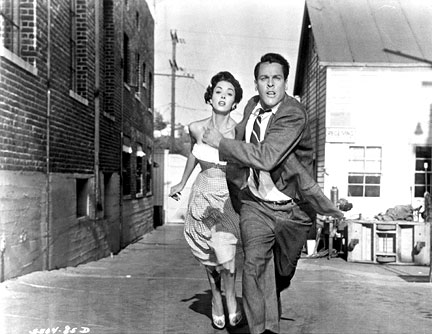 While arguably most famous for his leading role in Don Siegel's 1956 horror classic Invasion Of The Body Snatchers, Kevin McCarthy was also a favourite of director Joe Dante and it's as much for his cameos in Gremlins, The Howling, Innerspace, Matinee, Twilight Zone: The Movie and Piranha as his Body Snatchers' role — which he cutely reprised in Phil Kaufman's 1978 remake — that I remember him.
While arguably most famous for his leading role in Don Siegel's 1956 horror classic Invasion Of The Body Snatchers, Kevin McCarthy was also a favourite of director Joe Dante and it's as much for his cameos in Gremlins, The Howling, Innerspace, Matinee, Twilight Zone: The Movie and Piranha as his Body Snatchers' role — which he cutely reprised in Phil Kaufman's 1978 remake — that I remember him.
Saturday, 11 September 2010
Somewhere wins at Venice
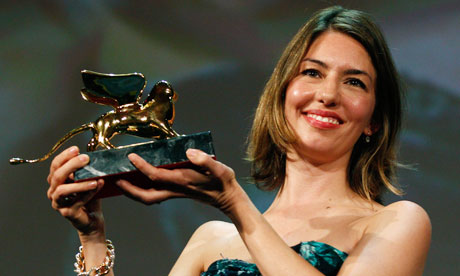 Sofia Coppola's Somewhere was the surprise winner of the Golden Lion in Venice tonight. I say "surprise" because the film was greeted with somewhat mixed reviews by critics last weekend, but, hey, what do they know.
Sofia Coppola's Somewhere was the surprise winner of the Golden Lion in Venice tonight. I say "surprise" because the film was greeted with somewhat mixed reviews by critics last weekend, but, hey, what do they know.Another surprise winner was Alex de la Iglesia, picking up the award for Best Screenplay and the Silver Lion for Best Director for Balada Triste de Trompeta. I was a fan of the film, but I certainly felt like I was in a minority in that regard on the Lido, and so I definitely consider that a turn up for the books, and a pleasant one, too.
In terms of the acting awards, Vincent Gallo had been many people's favourite to win for Best Actor for Essential Killing but the other bookies' pick, Natalie Portman for Black Swan, walked away empty-handed, the jury going instead for Ariane Labed in Attenberg, another film I liked very much, and one I will get around to reviewing soon.
The results can be found in full after the jump.
Friday, 10 September 2010
Thursday, 9 September 2010
Venice 2010: Zebraman 2: Attack On Zebra City, 13 Assassins
 Two from prolific Japanese filmmaker Takashi Miike, one (ostensibly) for the kids and one for the adults, the first a slapdash, disposable sequel to his 2004 feature and the second a remake of Eichi Kudo's 1964 black-and-white film of the same name.
Two from prolific Japanese filmmaker Takashi Miike, one (ostensibly) for the kids and one for the adults, the first a slapdash, disposable sequel to his 2004 feature and the second a remake of Eichi Kudo's 1964 black-and-white film of the same name.Zebraman 2: Attack On Zebra City is silly, sloppily made, with Hype Williams-esque video sequences, a ridiculously outfitted hero, masked police allowed to massacre innocent civilians with impunity, and a skyscraper-sized swishy CGI alien.
13 Assassins on the other hand is, by Miike's own standards, startlingly restrained, even though it features a near hour-long climactic siege with the eponymous assassins taking on 200-plus of their fellow samurai in a fortified village.
Set in 1844 in Feudal Japan, a time of relative peace, Miike's period epic stars Koji Yakusho as esteemed samurai Shinzaemon Shimade who is tasked to assassinate Lord Naritsugu (Goro Inagaki), son of the former Shogun and brother to the existing one, a vile and sadistic nobleman, and sets out to amass a series of like-minded samurai to help him.
Slow and stately to begin with, paying particular attention to the codes and rituals of the samurai, the pace picks up once the dirty, er, thirteen have been recruited, with Miike expertly mining Kurosawa's Seven Samurai for inspiration, and the film culminating in a staggering battle of steel and wits. Clearly produced on a bigger budget than he's used to, Miike wisely keeps it as real as possible, eschewing CGI blood and copious visual effects in favour of breathtaking swordplay and skilled stuntwork. A treat.
13 Assassins plays at the London Film Festival on October 23 and 24.
Venice 2010: The Town
Ben Affleck’s well-received directorial debut, Gone Baby Gone, demonstrated the actor — and Oscar-winning screenwriter of Good Will Hunting, let’s not forget — was just as capable behind the camera as in front of it. For his sophomore effort, a brisk, powerful and highly absorbing adaptation of Chuck Hogan’s bestseller Prince Of Thieves, Affleck not only directs and co-wrote the script, but heads up an impressive ensemble as former professional ice hockey player turned armed robber Doug MacRay, the leader of a four-man crew from Boston’s Charlestown district who rob banks with brutal efficiency.
The film begins with an onscreen card informing us that Charlestown has produced more bank and armoured car robbers than anywhere in the US then takes the audience straight into a riveting, crisply edited opening sequence in which Affleck’s crew hold up a Boston bank, then take Claire (Rebecca Hall), the assistant manager, hostage before letting her go. But Jem (The Hurt Locker’s Jeremy Renner), MacRay’s loose canon, second in command is concerned Claire might be able to identify them, especially when it turns out she’s from their neighbourhood. And so MacRay takes it upon himself to follow her around, but, soon, he’s smitten and the pair start a relationship, his blue-collar criminal seeing in her a chance at redemption and a way out of his nefarious lifestyle. Only, quitting is never easy when armed robbery is in the blood and Pete Postlethwaite’s malicious mob boss is relying on you to keep the jobs coming in. Meanwhile, Jon Hamm’s hardnosed FBI agent is on the crew’s tail…
As director, Affleck’s style is efficient and unfussy but remarkably assured. He takes his time developing characters you care about, realising that without the human drama, the other stuff doesn’t work. The performances across the board are excellent, right down to Chris Cooper’s brief cameo as MacRay’s incarcerated bank robbing pop and Blake Lively as his white-trash flirty former flame.
Well crafted and well acted, The Town reveals Affleck’s gift not only with his actors but with action, too — there are several riveting, high-adrenaline set pieces, beginning with MacRay’s well-drilled crew taking down Hall’s bank and ending with an audacious robbery and shoot out at Fenway Park, that Michael Mann would be proud to call his own. It’s the kind of smart, stylish, entertaining and grown-up movie that the studios are making less and less of these days and which, on the strength of his first two films, Affleck is clearly very good at.
Wednesday, 8 September 2010
When it rains it pours
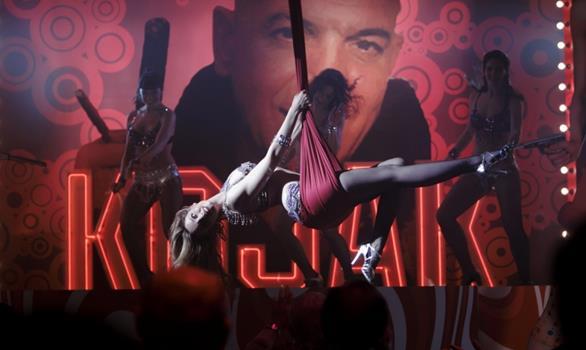 Another day, another thunderstorm. After last week's washout on the Lido, today began with another torrential storm that drenched everyone on their way to see Ben Affleck's The Town (myself included) and then proceeded to pour into the press room, causing it to be shut down for the second time this festival.
Another day, another thunderstorm. After last week's washout on the Lido, today began with another torrential storm that drenched everyone on their way to see Ben Affleck's The Town (myself included) and then proceeded to pour into the press room, causing it to be shut down for the second time this festival.Several journalists I spoke to after the film agreed that it sounded as if the rain was actually leaking into the cinema, the Sala Perla, during the screening itself, although, thankfully, not where I was sitting.
Still, at least, the film was a good one. I'll post a review soon, along with several others I've yet to get around to writing, among them Athina Rachel Tsangari intense and very moving Attenberg, Alex de la Iglesia's enjoyably grotesque and very bonkers Balada Triste de Trompeta (pictured above), and Takashi Miike's less violent but equally nuts Zebraman 2: Attack On Zebra City.
The latter is actually the first part of today's Miike double bill, with his 13 Assassins screening tonight...
Tuesday, 7 September 2010
Venice 2010: Promises Written In Water
Several years ago, I was present at the now infamous Cannes screening of Vincent Gallo’s The Brown Bunny, a film that brought hoots of derision and howls of laughter from a large number of those present. Gallo's latest effort behind the camera, which screened here yesterday as part of the Official Competition, makes The Brown Bunny look dynamic, action-packed and not that bad after all.
Gallo also stars in this tale of Kevin (Gallo) who works as an undertaker, smokes a lot, drives around, eats, takes photos of corpses, has dinner with, talks to and shouts at a woman played by French model Delfine Bafort who, in turn, spends much of the film naked. And that’s about it.
Shot in murky black and white, in extremely long takes, with the camera often focusing solely on Gallo (there’s one five-minute shot which consists of him, in close up, smoking a cigarette, pacing his room, before sitting down and sighing loudly), it's clear Gallo's aiming to replicate the moody, melancholic, monochromatic atmospheric art movies of yesteryear, but what he ends up with resembles an ineptly made student film, and even with a running time of 73 minutes is interminable.
The opening credits of Promises Written In Water begin with the words “edited by Vincent Gallo”, and are followed by another that proclaims “music by Vincent Gallo” before the final credit announces the film to be: “written, directed and produced by Vincent Gallo.” All of which, inevitably, provoked a few titters from the audience.
Gallo also stars in this tale of Kevin (Gallo) who works as an undertaker, smokes a lot, drives around, eats, takes photos of corpses, has dinner with, talks to and shouts at a woman played by French model Delfine Bafort who, in turn, spends much of the film naked. And that’s about it.
Shot in murky black and white, in extremely long takes, with the camera often focusing solely on Gallo (there’s one five-minute shot which consists of him, in close up, smoking a cigarette, pacing his room, before sitting down and sighing loudly), it's clear Gallo's aiming to replicate the moody, melancholic, monochromatic atmospheric art movies of yesteryear, but what he ends up with resembles an ineptly made student film, and even with a running time of 73 minutes is interminable.
1500
Posts that is, since I embarked on this particular venture back in 2007, and one that I felt deserved flagging up, if only to thank you all for your contributions thus far and to encourage you all to continue dropping by and joining in. Grazie.
Monday, 6 September 2010
Venice 2010: I'm Still Here

Casey Affleck’s “documentary” chronicling his brother-in-law Joaquin Phoenix’s retirement from acting to pursue a new career as a hip-hop musician is a perplexing beast, one that still has me scratching my head several hours after having seen it.
Going in, I was convinced all would be revealed as an elaborate ruse, a practical joke of sizeable proportions, a cunning critique and exposé of fame and celebrity culture in the 21st century. But, as the movie unfolds, your sense of what’s real, and what isn’t, and what exactly is the joke and on who is the joke being played, alters from moment to moment, scene to scene.
The movie begins with Phoenix’s proclaiming himself fed up of acting, tired of being “a puppet”, tired of his public persona as a tortured actor.
“I don’t want to play the character of Joaquin anymore,” he states. “Hate me or like me just don’t misunderstand me.” He wants to express his creativity through his music and bring “what’s inside me out”.
So far, so believable, but as Phoenix piles on the pounds, hides away behind long hair and a shaggy beard; tells his agent and publicist he’s quitting Hollywood; pursues P Diddy across America in an attempt to get him to produce his first album; “raps” in his home studio; engages in various frat house-style antics involving drugs, alcohol and setting hair alight with his buddies; orders up a pair of escorts from the internet and is filmed not only frolicking with them but using the breasts of one of them to partake of some, ahem, white powder; and verbally abuses his assistants, the joke ceases to be as funny anymore with Phoenix coming across as a self-centred, boorish, needy, deeply unpleasant individual and an obnoxious bore.
And by the time he appears on the David Letterman Show to promote his “last” movie role in Two Lovers and is virtually mute — to the host’s visible annoyance — or agrees to rap at a Miami nightclub, only to get into a fight with one member of the audience, you don’t quite know what to think any more. In fact, I’m still not sure what to make of the incident when Ben Stiller turns up at his home with the script for Greenberg to ask him to play the role of Ivan, and Phoenix slags him off to his face. Stiller’s reaction certainly looks real. (Maybe I’m being unkind and he’s a better actor than I give him credit for.) Later, Stiller shows up at the Oscars “doing a Joaquin” and wearing a beard and sunglasses.
Some moments definitely do feel staged — a disgruntled personal assistant defecating on Phoenix’s face, for instance — others less so, although the end credits claim the film to be “written and produced by Casey Affleck and Joaquin Phoenix” — and list the names of actors in various roles, including Tim Affleck as Phoenix’s father.
Going in, I was convinced all would be revealed as an elaborate ruse, a practical joke of sizeable proportions, a cunning critique and exposé of fame and celebrity culture in the 21st century. But, as the movie unfolds, your sense of what’s real, and what isn’t, and what exactly is the joke and on who is the joke being played, alters from moment to moment, scene to scene.
The movie begins with Phoenix’s proclaiming himself fed up of acting, tired of being “a puppet”, tired of his public persona as a tortured actor.
“I don’t want to play the character of Joaquin anymore,” he states. “Hate me or like me just don’t misunderstand me.” He wants to express his creativity through his music and bring “what’s inside me out”.
So far, so believable, but as Phoenix piles on the pounds, hides away behind long hair and a shaggy beard; tells his agent and publicist he’s quitting Hollywood; pursues P Diddy across America in an attempt to get him to produce his first album; “raps” in his home studio; engages in various frat house-style antics involving drugs, alcohol and setting hair alight with his buddies; orders up a pair of escorts from the internet and is filmed not only frolicking with them but using the breasts of one of them to partake of some, ahem, white powder; and verbally abuses his assistants, the joke ceases to be as funny anymore with Phoenix coming across as a self-centred, boorish, needy, deeply unpleasant individual and an obnoxious bore.
And by the time he appears on the David Letterman Show to promote his “last” movie role in Two Lovers and is virtually mute — to the host’s visible annoyance — or agrees to rap at a Miami nightclub, only to get into a fight with one member of the audience, you don’t quite know what to think any more. In fact, I’m still not sure what to make of the incident when Ben Stiller turns up at his home with the script for Greenberg to ask him to play the role of Ivan, and Phoenix slags him off to his face. Stiller’s reaction certainly looks real. (Maybe I’m being unkind and he’s a better actor than I give him credit for.) Later, Stiller shows up at the Oscars “doing a Joaquin” and wearing a beard and sunglasses.
Some moments definitely do feel staged — a disgruntled personal assistant defecating on Phoenix’s face, for instance — others less so, although the end credits claim the film to be “written and produced by Casey Affleck and Joaquin Phoenix” — and list the names of actors in various roles, including Tim Affleck as Phoenix’s father.
That being said, if it was all one big joke — and my gut tells me it is — then we really must applaud Phoenix’s Andy Kaufman-like transformation, and his ability to stay in character for close to a year and a half. That’s what I call dedication to the cause. And, if it really is all a performance, then it’s arguably deserving of some awards attention.
At the press conference that followed this morning’s press screening, Affleck wouldn’t be drawn on the veracity of his film, and danced around the various attempts to draw him out about what was real and what was faked, so as not to spoil it for an audience, he claimed, (which is an answer in itself), and when asked directly how he would answer claims that the film was a hoax, replied: “Elliptically.” There is no hoax, he continued. “The idea of a hoax makes me think of Candid Camera.”
He said he felt the film was “a very sympathetic portrait” of Phoenix and that “I feel for him and I understand him better than I did at the beginning.”
Phoenix himself wasn’t at the press conference, but was scheduled to appear on the red carpet for the official screening later today. One journalist spotted him on a plane from London described him as beardless and thin.
What did he think of the film, asked one Italian journalist?
“I think he’s trying to embrace [it],” said Affleck, “and I hope him will support it but in what capacity is up to him.”
So, truth or fiction? I suspect the answer will only be revealed when, or if, Phoenix starts acting again. And as someone who’s long admired his work, I hope so he does.
Certainly on the evidence of this film, he’s no great shakes at hip-hop.
At the press conference that followed this morning’s press screening, Affleck wouldn’t be drawn on the veracity of his film, and danced around the various attempts to draw him out about what was real and what was faked, so as not to spoil it for an audience, he claimed, (which is an answer in itself), and when asked directly how he would answer claims that the film was a hoax, replied: “Elliptically.” There is no hoax, he continued. “The idea of a hoax makes me think of Candid Camera.”
He said he felt the film was “a very sympathetic portrait” of Phoenix and that “I feel for him and I understand him better than I did at the beginning.”
Phoenix himself wasn’t at the press conference, but was scheduled to appear on the red carpet for the official screening later today. One journalist spotted him on a plane from London described him as beardless and thin.
What did he think of the film, asked one Italian journalist?
“I think he’s trying to embrace [it],” said Affleck, “and I hope him will support it but in what capacity is up to him.”
So, truth or fiction? I suspect the answer will only be revealed when, or if, Phoenix starts acting again. And as someone who’s long admired his work, I hope so he does.
Certainly on the evidence of this film, he’s no great shakes at hip-hop.
Venice 2010: Essential Killing
I arrived in Venice having resigned myself to the fact that I wasn’t going to be able to catch up with either Black Swan or Somewhere and hoped that my first filmgoing experience of this year’s festival, Jerry Skolimowski’s Essential Killing, would prove to be an auspicious opener. Alas, that wasn’t to be the case.
The story of Mohammed (Vincent Gallo), a member of the Taliban who, in the film’s striking opening sequence, kills three Americans, two contractors, one soldier, with a rocket launcher in a desert cave system, before being shipped off to, first, a US detention centre in Afghanistan, where he is tortured, before being airlifted to an unnamed, snow-covered East European country. En route to presumably another Guantanamo-esque detention camp, the van transporting him overturns during a freak road accident and Mohammed manages to escape, killing another two US soldiers in the process.
From there on in, the film becomes a cross-country survivalist tale, as Gallo’s character, who doesn’t utter a word throughout, tries to stay one step ahead of his pursuers as he treks across a bleak, hostile winter wilderness, subsisting on ants, tree bark and in a scene that's become something of talking point here, supping on the breast milk of a pregnant woman who happens to be breastfeeding her young baby at the time.
Veteran Polish director Skolimowski deserves admiration for both his film’s refusal to judge Mohammed for his actions and its attempt to elicit our sympathies in a central character who, as the title suggests, kills in order to survive, as well as for Adam Sikora’s cinematography — there are a couple of breathtakingly vertiginous landscape shots of the Afghan desert and a snow-covered pine forest that are quite sensational — but, ultimately, I wasn’t taken with the drama of it all as some others here were.
Saturday, 4 September 2010
Quick view: Never Let Me Go
 Seeing as several critics have weighed in on Never Let Me Go following its Telluride premiere, I thought I'd add a few brief thoughts of my own to the growing response.
Seeing as several critics have weighed in on Never Let Me Go following its Telluride premiere, I thought I'd add a few brief thoughts of my own to the growing response.For me Never Let Me Go is an extraordinary piece of cinema, an intensely moving, deeply emotional, extremely haunting, beautifully shot, wonderfully acted work of art.
The pitch-perfect script by Alex Garland remains incredibly faithful to Kazuo Ishiguro's source material yet expertly streamlines and focuses the novel's fractured timeline into a movie's traditional three-act structure without losing any of the book's subtly or power or humanity.
The performances are all top drawer, although Carey Mulligan's is, inevitably, the standout, her delicate portrayal of the film's narrator Kathy, calm and collected on the outside, an ever-changing torrent of emotions just below the surface, deserves every accolade available to her. Andrew Garfield and Keira Knightley provide superior support; as do the three children who play their younger selves. Sally Hawkins shines, too, in a small but pivotal role.
Praise, too, for Rachel Portman's captivating score and to cinematographer Adam Kimmel and director Mark Romanek for their exquisite compositions.
Apparently some at Telluride found the movie cold and remote. My reaction couldn't be more different. I literally could not speak for half an hour after seeing it, so overwhelmed and affected was I. Given that I'd read both the book and the script beforehand, that's even more remarkable.
Friday, 3 September 2010
Dredd's girl

Olivia Thirlby, she of Juno, The Wackness and the forthcoming The Darkest Hour, has been cast as telepathic rookie Judge Cassandra Anderson in the Alex Garland-scripted 3D Judge Dredd reboot opposite Karl Urban's eponymous lawman. Garland's script is impressively action-packed and extremely faithful to the source material, and Thirlby's part is a tasty one. Shooting starts this November in South Africa.
Venice 2010: Somewhere
"A cloying sense of déjà vu radiates from Somewhere, Sofia Coppola’s long-gestating follow-up to her divisive postmodern historical biopic Marie Antoinette (2006)," writes Time Out's David Jenkins. "That’s not to dismiss the movie as a failure, it just forces viewers to make a judgement call as to whether her ongoing concerns regarding the alienation suffered by the pampered, beautiful elite (a world she obviously knows very well) coalesce into a satisfying body of work or whether she’s simply making variations on the same movie. So let's chalk this one up as existing in that peculiar space between La Dolce Vita and Entourage."
"Anyone expecting fireworks from Sofia Coppola after the lavish and controversial Marie Antoinette will be disappointed with Somewhere," writes Derek Malcolm in the Evening Standard. "This quiet and restrained portrait of Hollywood star Johnny Marco (Stephen Dorff) and his on-off relationship with his 12-year-old daughter Chloe (Elle Fanning) is not the noisy showbiz chronicle other directors might well have made it.
"Like Monet returning to his lilies, though with perhaps diminishing effect, filmmaker Sofia Coppola has returned to the daddy-daughter theme and to the world of flat, blank, affectless movie actors in flat, blank, affectless hotel rooms," writes Peter Bradshaw in The Guardian. "Weirdly, the movie looks like an acidly satirical comedy about LA celebrity but with all the acidly satirical comedy removed, so that all that is left is a skeleton outline, a series of scenes and locations – hotel rooms, lobbies, swimming pools, luxury automobile interiors – in which essentially gentle, forgiving dialogue takes place."
Thursday, 2 September 2010
Traier: Buried
Thus far, I have missed every opportunity to see this, so I suspect I will have to wait till it's released here in the UK later this month. Here's the UK trailer.
Wednesday, 1 September 2010
Is it me?
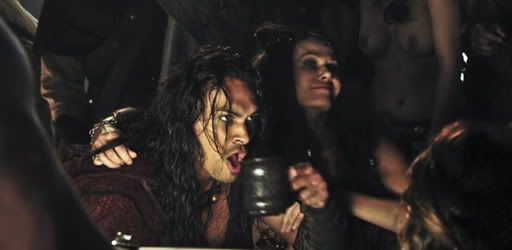
I know one shouldn't judge a movie by its advance stills, but why is it every photo thus far released for the new Conan has me less and less interested and reaching for my DVD of the Arnie/Milius version? Oh, it's because every photo looks increasingly shite, that's why.
Venice 2010: Black Swan
I won't be in Venice until the weekend, but Darren Aronofsky's Black Swan press screened this morning, and the general consensus appears to be pretty positive.
"Resembling a Red Shoes on acid, Black Swan takes the idea of giving one’s all for art to a morbid extreme," writes Indiewire's Todd McCarthy. "Applying the gritty handheld technique he successfully employed in the working class environs of The Wrestler to the rarefied domain of classical ballet, Darren Aronofsky swooningly explores the high tension neuroses and sexual psychodrama of a ballerina on the brink of simultaneous triumph and breakdown. With Natalie Portman, in the demanding leading role, equaling her director in unquestioned commitment, the central issue for the viewer is how far one is willing to follow the film down the road to oblivion for art’s sake."
"A wicked, sexy and ultimately devastating study of a young dancer's all-consuming ambition, Black Swan serves as a fascinating complement to Darren Aronofsky's The Wrestler, trading the grungy world of a broken-down fighter for the more upscale but no less brutal sphere of professional ballet," writes Variety. "Centerstage stands Natalie Portman, whose courageous turn lays bare the myriad insecurities genuinely dedicated performers face when testing their limits, revealing shades of the actress never before seen on film. As with The Wrestler, Fox Searchlight faces formidable marketing challenges, likely exploiting the psychosexual thriller's racier elements to eke out a similarly modest score."
"Already back on track after Venice Golden Lion winner The Wrestler, Darren Aronofsky soars to new heights with Black Swan, an enthralling drama set in the competitive world of ballet," writes ScreenDaily's Mike Goodridge. "Alternately disturbing and exhilarating, this dark study of a mentally fragile performer derailed by her obsession with perfection is one of the most exciting films to come out of the Hollywood system this year. Indeed it’s the perfect film to open the autumn season with its gala at Venice tonight, a bold display of cinematic fireworks that will leave audiences breathless."
"Resembling a Red Shoes on acid, Black Swan takes the idea of giving one’s all for art to a morbid extreme," writes Indiewire's Todd McCarthy. "Applying the gritty handheld technique he successfully employed in the working class environs of The Wrestler to the rarefied domain of classical ballet, Darren Aronofsky swooningly explores the high tension neuroses and sexual psychodrama of a ballerina on the brink of simultaneous triumph and breakdown. With Natalie Portman, in the demanding leading role, equaling her director in unquestioned commitment, the central issue for the viewer is how far one is willing to follow the film down the road to oblivion for art’s sake."
"A wicked, sexy and ultimately devastating study of a young dancer's all-consuming ambition, Black Swan serves as a fascinating complement to Darren Aronofsky's The Wrestler, trading the grungy world of a broken-down fighter for the more upscale but no less brutal sphere of professional ballet," writes Variety. "Centerstage stands Natalie Portman, whose courageous turn lays bare the myriad insecurities genuinely dedicated performers face when testing their limits, revealing shades of the actress never before seen on film. As with The Wrestler, Fox Searchlight faces formidable marketing challenges, likely exploiting the psychosexual thriller's racier elements to eke out a similarly modest score."
"Already back on track after Venice Golden Lion winner The Wrestler, Darren Aronofsky soars to new heights with Black Swan, an enthralling drama set in the competitive world of ballet," writes ScreenDaily's Mike Goodridge. "Alternately disturbing and exhilarating, this dark study of a mentally fragile performer derailed by her obsession with perfection is one of the most exciting films to come out of the Hollywood system this year. Indeed it’s the perfect film to open the autumn season with its gala at Venice tonight, a bold display of cinematic fireworks that will leave audiences breathless."
Never Let Me Go clip
I really wish I could tell you how much I love this film, but for now, you'll have to make do with this instead.
CLiNT magazine
Subscribe to:
Comments (Atom)


